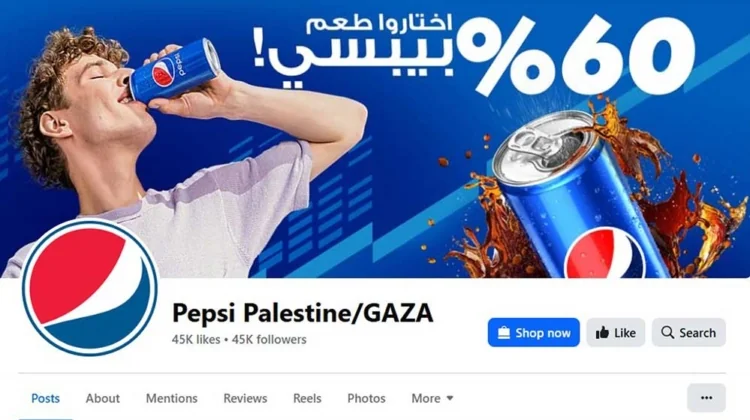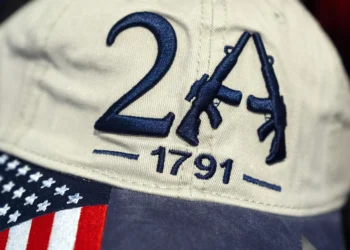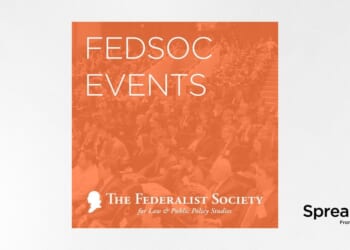
[Want even more content from FPM? Sign up for FPM+ to unlock exclusive series, virtual town-halls with our authors, and more—now for just $3.99/month. Click here to sign up.]
In 2020, PepsiCo, the multinational food and beverage giant behind brands like Pepsi, Lay’s, Quaker, and Gatorade, partnered with a Pakistani charity to distribute meals throughout Pakistan. But what appeared to be a routine corporate social responsibility campaign hides a far more disturbing truth: The charity in question, Al-Khidmat Foundation (AKF), is a known financier of the Hamas terrorist organization.
Images from the campaign prominently displayed the logos of Pepsi and Lay’s alongside that of AKF, advertising a corporate-backed food relief initiative. However, AKF’s ties to terrorism are well documented. As first reported by this author, Al-Khidmat has served as a financial conduit for Hamas, funneling money to the group’s leadership.
Al-Khidmat’s Open Admiration for Hamas
The Al-Khidmat Foundation operates as the charitable wing of Jamaat-e-Islami (JI), a Pakistani Islamist party with a long history of extremist connections. AKF openly supports Hamas, which is recognized as a terrorist organization by the United States, the European Union, and much of the free world. As recently as April 2025, AKF’s official website quoted Hamas directly in its propaganda, stating:
“The Israeli occupation ‘continues to target children through systematic crimes, including using them as human shields, depriving them of education, and attempting to sever their national identity in the occupied territories of 1948 through manipulation of curricula, the spread of crime, and the destruction of values.’ – Hamas.”
AKF’s history is not limited to inflammatory rhetoric. In 2006, AKF took a delegation to Damascus, Syria, to meet with Khaled Meshal, then-global leader of Hamas, and hand-deliver a check for $100,000 to him in support of Hamas and its bloodshed against Israel. According to Jamaat-e-Islami, in a post made on its website, Meshal thanked the delegation and declared that Hamas would “continue to wage jihad” against the “Zionist yoke.”
In October 2023, days after Hamas’ deadly attack on Israel that left nearly 1,200 innocents dead and 251 kidnapped, Umair Ahmed Siddiqui, President of Jamaat-e-Islami North Karachi, openly tweeted: “Donate [to] the Palestinian brothers and Mujahideen of Hamas. Give your donations to Al-Khidmat.”
PepsiCo’s Pattern of Affiliation with Islamist Organizations
Unfortunately, this partnership is not an isolated incident. PepsiCo has a long-standing affiliation with another radical Muslim organization: the Islamic Food and Nutrition Council of America (IFANCA). IFANCA is responsible for providing halal certification to food companies in the U.S. and abroad. Its influence extends beyond certification, with ties to Islamist ideology and questionable associations.
Ahmad Sakr (now deceased) was a founding board member of IFANCA. He also served prominent roles in several other radical Islamic groups, including the Muslim Students Association (MSA), the North American Islamic Trust (NAIT), and the Muslim World League (MWL). In his book, Pork: Possible Reasons for its Prohibition, Sakr referred to Jews using deeply offensive and anti-Semitic language, describing them as “cursed,” “idol-worshipers,” “monkey-like,” “filthy,” “gluttonous,” “corrupt,” “gross,” and “swines.”
One of the current members of IFANCA’s Board of Directors is Mahmoud Harmoush, the Imam of the Islamic Center of Riverside (ICR), California. In July 2017, Harmoush told his congregation that Jews were plotting to take over “most of the Middle East.” He labeled Jews “unjust tyrants” and called on Allah to “destroy” them. Numerous Jewish groups, including the Anti-Defamation League (ADL), condemned Harmoush. The California Legislative Jewish Caucus described the Imam’s comments as “outrageous death threats.”
A 2021 Middle East Forum (MEF) investigation found that IFANCA has been funneling money to radical Islamic organizations under the guise of halal certification. MEF reported that by 2019, IFANCA amassed nearly $70 million in assets and reported more than $25 million in annual revenue, despite collecting only about $2.7 million from halal certification fees. Meanwhile, tax filings from 2012 to 2019 reveal substantial grants to Islamist groups such as the Al-Furqaan Foundation, the Islamic Circle of North America (ICNA), the Council on American-Islamic Relations (CAIR), and the Council of Islamic Organizations of Greater Chicago (CIOGC).
On the IFANCA Pakistan division’s website, the logos of several PepsiCo-associated brands – including Pepsi, Lay’s, Tropicana, Quaker, and Gatorade – are displayed. These logos suggest an ongoing commercial relationship. Indeed, PepsiCo’s affiliation with IFANCA stretches back to at least 2010, when Pepsi’s logo was featured in Halal Consumer, IFANCA’s quarterly publication.
PepsiCo’s Gaza Division and the Irony of BDS
Despite these anti-Jewish and pro-Hamas associations, PepsiCo has also found itself the target of the anti-Israel Boycott, Divestment, and Sanctions (BDS) movement. PepsiCo owns two Israeli-affiliated companies: Sabra (a joint venture with the Strauss Group) and SodaStream, the Israeli home-carbonation company acquired in 2018. While Israeli Prime Minister Netanyahu hailed the $3.2 billion SodaStream acquisition as a “huge deal that will enrich state coffers,” the move infuriated anti-Israel activists, who called for a global boycott of PepsiCo products.
Ironically, Pepsi had benefited from another Israel-related boycott – this one targeting its chief competitor, Coca-Cola, which was boycotted by the Arab League from 1967 to 1991 for opening up an Israeli-owned franchise. In 1961, Pepsi opened up a Gaza factory – the Yazeji Soft Drinks Company – which may not exist any longer but still has a colorful Facebook page.
Pepsi’s contradictory positioning – appeasing both Islamists and trying to profit from Israeli markets – might be seen as the cost of doing business in a globalized economy. But when a company collaborates, knowingly or not, with financiers of terror, that cost becomes far too high.
Conclusion: The Need for Corporate Accountability
Multinational corporations wield immense power and influence. With that power comes a moral responsibility to avoid partnerships that enable, legitimize, or empower organizations tied to violence and extremism. PepsiCo’s willingness to collaborate with the Al-Khidmat Foundation, a group whose history of financial support for Hamas is documented, demonstrates a failure of corporate responsibility.
Moreover, PepsiCo’s continuing affiliation with IFANCA adds to a troubling pattern of alignment with Islamist-linked institutions. It is high time for the company to re-evaluate its relationships and apply rigorous vetting standards to every partner it associates with.
Consumers, shareholders, and the public at large should demand transparency and accountability from one of the world’s largest food and beverage companies. Supporting terrorism – directly or indirectly – should never be the price of doing business.
Beila Rabinowitz, Director of Militant Islam Monitor, contributed to this report.
















